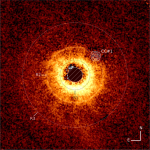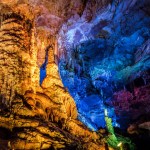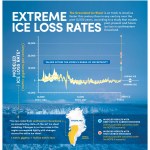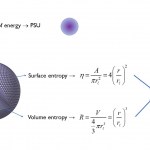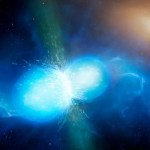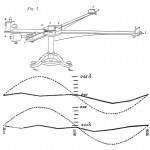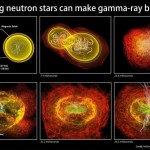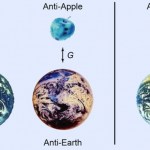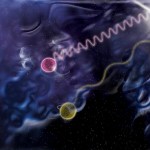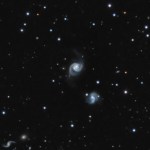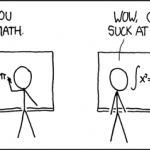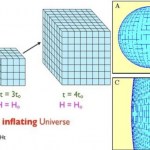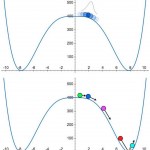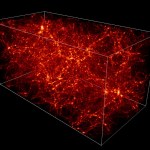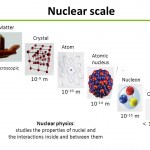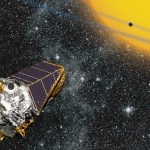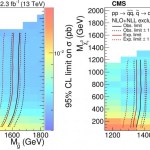By now, everyone has heard of “spooky action at a distance” and probably know that Albert Einstein was the chief skeptic about quantum mechanics, calling it a “ghost.” Except he wasn’t. What he wrote to Max Born in March of 1947 he referred to spukhafte Fernwirkung - a ghostly long-term effect, which is not really the same thing as a spooky action. Spook is a Dutch word, and relatively new, there is no record of it before the early 1800s, and given Dutch etymology it was a noun rather than an adjective. Ghouls, ghasts, ghents, ghours, and goblins are all basically the same thing, so…
Physical Sciences
The James Webb Space Telescope, launched in 2021 and on active duty since 2022, has gotten its legs viewing already known exoplanets but can now take credit for its first direct image of a previously unknown one.
Exoplanets have been detected since 1992 when two, named named Poltergeist and Phobetor, were found orbiting the pulsar PSR B1257+12.
Since then they have become key targets in astronomy, in hopes that capturing snapshots in time can help us understand how planetary systems form. Thousands have been detected indirectly but because they are less bright due to being '…
In the Yangtze Delta, about 160 kilometres southwest of Shanghai, the archeological ruins of Liangzhu City are located. There, a highly advanced culture blossomed about 5,300 years ago, thanks to the engineering of large hydraulic structures.
The walled city had a complex system of navigable canals, dams and water reservoirs. This system made it possible to cultivate very large agricultural areas throughout the year. In the history of human civilization, it is one of the first examples of highly developed communities based on a water infrastructure.
And they did it all without metal.…
A new estimate using sheet modeling finds that Greenland's rate of ice loss this century could outpace that of any century over the past 12,000 years, when the last Ice Age ended.
Scientists used reconstructions of ancient climate to drive the model, and validated the model against real-world measurements of the ice sheet's contemporary and ancient size.
The study brought together climate modelers, ice core scientists, remote sensing experts and paleoclimate researchers. The team used an ice sheet model to simulate changes to the southwestern sector of the Greenland Ice Sheet…
As surprising as it may sound, no one really knows what an electron is, and it is this fundamental question that has been the driving force for much of modern physics and eventually led to the development of quantum field theory.
To answer the question “What is an electron?”, you would think the first step would be to observe it. However, that is easier said than done. Electrons are simply too small for us to observe - the smallest thing we can observe is an atom and even that is not observed with a traditional microscope.
So, we can’t observe an electron, however we can observe its…
"Delay is the deadliest form of denial." -C. Northcote Parkinson
Every massless particle and wave travels at the speed of light when it moves through a vacuum. Over a distance of 130 million light years, the gamma rays and gravitational waves emitted by merging neutron stars arrived offset by a mere 1.7 seconds, an incredible result! Yet if the light was emitted at the same time as the merger, that 1.7 second delay shouldn’t be there, unless something funny is afoot.
In the final moments of merging, two neutron stars don't merely emit gravitational waves, but a catastrophic explosion that…
“On what can we now place our hopes of solving the many riddles which still exist as to the origin and composition of cosmic rays?” –Victor Francis Hess
It’s often said that advanced in physics aren’t met with “eureka!” but rather with “that’s funny,” but the truth is even stranger sometimes. Rather than the scientific method of: hypothesis, method, experiment, results, conclusion, revise, repeat, etc., many times throughout history, it’s been a series of surprise observations that have often led to our greatest leaps forward. When the speed of light was discovered not to differ…
"Dark matter is interesting. Basically, the Universe is heavier than it should be. There's whole swathes of stuff we can't account for." -Talulah Riley
One of the most puzzling facts about the Universe is that 95% of the energy in it, in the forms of dark matter and dark energy, are completely invisible, and have never been directly detected. Perhaps, the story goes, it’s our theory of gravity that’s to blame, rather than needing new components in the Universe. While dark matter and dark energy can explain a whole slew of observations, gravity modifications do a better job of explaining…
“Normal science, the activity in which most scientists inevitably spend almost all their time, is predicated on the assumption that the scientific community knows what the world is like.” -Thomas S. Kuhn
For all of human history, the biggest questions have fascinated us. Where did the Universe come from? How old is it? And what is its ultimate fate? Once relegated to the realm of theologians, poets, and philosophers, science has brought us closer than ever to the answers. But scientific revolutions have occurred before, in many cases significantly changing the answers to these and other…
"O. Hahn and F. Strassmann have discovered a new type of nuclear reaction, the splitting into two smaller nuclei of the nuclei of uranium and thorium under neutron bombardment. Thus they demonstrated the production of nuclei of barium, lanthanum, strontium, yttrium, and, more recently, of xenon and caesium. It can be shown by simple considerations that this type of nuclear reaction may be described in an essentially classical way like the fission of a liquid drop, and that the fission products must fly apart with kinetic energies of the order of hundred million electron-volts each." -Lise…
"Designing a station with artificial gravity would undoubtedly be a daunting task. Space agencies would have to re-examine many reliable technologies under the light of the new forces these tools would have to endure. Space flight would have to take several steps back before moving forward again." -Andy Weir
Ever wonder, in those science fiction shows, how space travelers always stay “down” on their starship? Irrespective of acceleration, and despite the fact that the astronauts we have in orbit around Earth are weightless, they’re always depicted as having a floor and a ceiling that are…
"This is going to have a bigger impact on science and human understanding, in many ways, than the first discovery of gravitational waves. We're going to be puzzling over the observations we've made with gravitational waves and with light for years to come." -Duncan Brown
Detecting black holes and the gravitational wave signals from them was an incredible feat, but doing the same thing for neutron star mergers is a true game-changer. Instead of fractions of a second, neutron star mergers show up for up to half a minute. Unlike black holes, there’s an electromagnetic counterpart. Because of…
"It’s becoming clear that in a sense the cosmos provides the only laboratory where sufficiently extreme conditions are ever achieved to test new ideas on particle physics. The energies in the Big Bang were far higher than we can ever achieve on Earth. So by looking at evidence for the Big Bang, and by studying things like neutron stars, we are in effect learning something about fundamental physics." -Martin Rees
When the Advanced LIGO detectors turned on in 2015, it shook up the world when they detected their first event: the merger of two quite massive black holes. Since that time, they’ve…
“We do not realize what we have on Earth until we leave it.” -Jim Lovell
Well, the Scienceblogs comments are still on the fritz, requiring me to manually un-spam them one-at-a-time, but Starts With A Bang! is still going strong with some fabulous stories based on the best knowledge we have! This next week is poised to be a doozy of a fantastic one, as Treknology is out at last (Amazon is having a sale on it today, and my copies arrive on Wednesday), so next weekend I'll have special instructions for you on how to order autographed copies from me. Also, check out Starts…
“If the doors of perception were cleansed every thing would appear to man as it is, Infinite. For man has closed himself up, till he sees all things thro' narrow chinks of his cavern.” -William Blake
When it comes to the ultimate question of the size of the Universe, we have to look to greater scales than what we can possibly observe. Although we can place constraints on how big the unobservable Universe must be, coming up with a lower limit to its overall size, there’s a bigger question that we don’t yet know the answer to: is it finite in size, or is it truly infinite?
The observable…
"It’s hard to build models of inflation that don't lead to a multiverse. It’s not impossible, so I think there’s still certainly research that needs to be done. But most models of inflation do lead to a multiverse, and evidence for inflation will be pushing us in the direction of taking [it] seriously." -Alan Guth
It sounds like an unprovable fantasy: the idea that our Universe is just one of countless others, dotted across an eternally expanding empty space separating them. That’s generally how we picture the Multiverse, with each Universe having its own hot Big Bang distinct from every…
"There are stars leaving the Milky Way, and immense gas clouds falling into it. There are turbulent plasmas writhing with X- and gamma-rays and mighty stellar explosions. There are, perhaps, places which are outside our universe. The universe is vast and awesome, and for the first time we are becoming a part of it." -Carl Sagan
It’s no secret that if we look at the matter we see in the Universe, the story doesn’t add up. On all scales, from individual galaxies to pairs, groups and clusters of galaxies, all the way up to the large-scale structure of the Universe, the matter we see is…
“It’s easier to hold onto a bad idea if you never share it, and it’s harder to defend one if you let it out.” -Victor LaValle
After catching up with a big double-dose of our comments last week, Starts With A Bang! is here again with the latest! For those of you looking forward to my newest book, Treknology, it drops just one week from today! I will have special instructions on next week's comments of the week for anyone who wants me to personally ship them an autographed copy, so look for it if you want one! With that said, let's take a look back at our past week, and all the…
"How vast those Orbs must be, and how inconsiderable this Earth, the Theatre upon which all our mighty Designs, all our Navigations, and all our Wars are transacted, is when compared to them." -Christiaan Huygens
With a field-of-view encompassing 150,000 stars, NASA’s Kepler mission delivered an overwhelming prize when it came to hunting worlds beyond our own Solar System: thousands of new exoplanets. The majority of them, however, were different from what we have at home. They were larger, more massive, closer to their parent stars, and orbiting more quickly than what we find in our own…
“Some people believe holding on and hanging in there are signs of great strength. However, there are times when it takes much more strength to know when to let go and then do it.” -Ann Landers
The history of physics is littered with brilliant ideas that have revolutionized how we look at the Universe... and have been discarded entirely because they’ve failed to describe reality. Theories like the Tired-Light alternative to relativity, the Steady-State alternative to the Big Bang, and even the Sakata Model alternative to the quark model of particles have come and gone, with practically no one…

